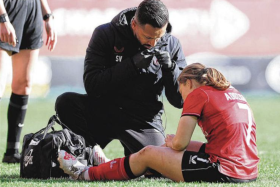Can watching heart-stopping World Cup matches give you a heart attack?
Study shows watching stressful football matches may increase heart attack risk
For some football fans, a match can be heart-stopping.
Last Monday, an Egyptian man died shortly after his home team lost 1-2 to Saudi Arabia during the World Cup in Russia.
Television commentator Abdel Rahim Mohamed suffered a heart attack, and it is understood that the pundit felt emotional during and after the game.
In the last World Cup four years ago, a 69-year-old Brazilian man died of a heart attack after watching a penalty shoot-out between his team and Chile. It was reported that paramedics also treated 100 people who were taken ill or had become overwrought by excitement during the same match.
A study published in 2008 in the New England Journal of Medicine concluded that watching a stressful football match "more than doubles the risk of an acute cardiovascular event", meaning a heart attack or stroke.
Researchers also found that cardiac emergencies usually occur within two hours of the start of a match.
An acute cardiovascular event may be triggered by a surge of adrenaline release. Adrenaline is a stress hormone that the brain releases during emotionally-charged moments.
In the World Cup, this could include a penalty shoot-out or when a team scores a goal.
Dr Leslie Tay, an interventional cardiologist at Mount Elizabeth Hospital, told The New Paper: "Not everyone who watches the World Cup experiences extreme emotions. The diehard fans who are really into the game are the ones who face a higher risk of an acute cardiovascular event, like strokes and heart attacks.
"This risk is heightened for individuals with underlying risk factors such as diabetes, hypertension or high cholesterol."
Other contributing factors are related to an individual's lifestyle, such as smoking or not getting adequate exercise.
"As a general rule, anyone who wishes to take part in an emotionally or physically stressful activity, such as the World Cup, should take some precautionary measures before proceeding," he said.
"Check with your cardiologist, who can determine the appropriate tests to see whether you have any heart disease and if treatment is required."
A cardiologist can also diagnose whether individuals have underlying risk factors and if those are under adequate control.
Dr Tay recommends exercising, which improves sugar, blood pressure and cholesterol levels - the very culprits behind the underlying risk factors which lead to an acute cardiovascular event.
Some of his patients go through a cardiac rehabilitation programme which is tailored to the individual, depending on his health and heart condition , age and fitness level.
"Exercise is a lifestyle change, not just a short-term solution," he said.
Get The New Paper on your phone with the free TNP app. Download from the Apple App Store or Google Play Store now


